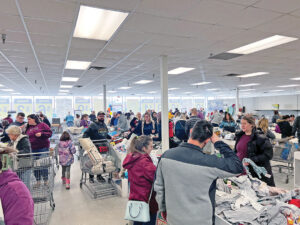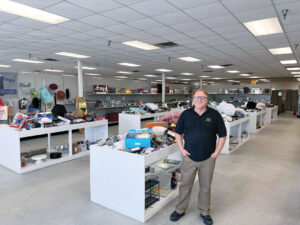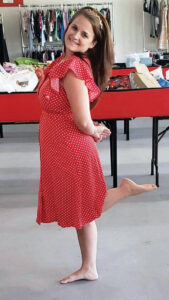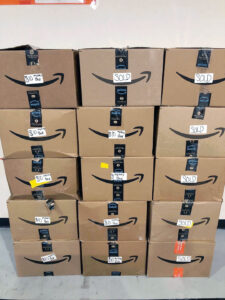Modern day treasure hunting
3/1/2023
Customers fill The Looney Bin Store in Clive within minutes of opening.
Customers line up outside the store on a warm Saturday morning in February. Seventy-nine tickets are handed out before the store even opens — tickets that determine the order of entry. Once 10 a.m. hits, those first in line run into the store. By 10:02, carts are full. At 10:05, the first purchase is made.
“I think there’s a certain kind of a mental high you get, coming into a place like this, not knowing what you’re going to find,” said store owner David Gantt.
To the average onlooker, this scene might appear to be taken out of a Black Friday playbook; and, for some, it truly is. Customers rifle through bins of product overstock, returns, unsold clearance items and liquidation assets. Some of the luckiest customers leave with LEGO sets, scooters, board games, bedding and TV stands for only $9. If it doesn’t sell on Saturday, the price will be lowered to $6 apiece on Sunday, then $3 on Monday. The chaos returns on Tuesday when everything is only $1.
“Instead of pricing stuff, the whole concept is let the customers decide what it’s worth,” Gantt said.

David Gantt owns The Looney Bin Store in Clive.
The Looney Bin Store
Before opening The Looney Bin Store in Clive, Gantt had no real previous experience in retail. But now, he and his wife, Diane, week after week, find themselves stocking up their store for Saturday mornings.
Gantt got the idea when he was visiting his daughter’s father-in-law in Tulsa, Oklahoma. Bobby, as they call him, successfully runs two bin stores in that market.
“I thought it looked like an interesting business that Des Moines could use,” Gantt said.
Gantt went on to spend weeks in Tulsa learning the tricks of the trade. He wanted to duplicate what Bobby was doing as closely as possible. Soon, Gantt learned what he needed to know about suppliers, inventory and how to run a successful bin store.
Beginning in the summer of 2021, the Gantts began their search for their store location. In April 2022, they opened their doors for the first time. At the time, The Looney Bin Store was central Iowa’s biggest bin store in terms of square footage.

Rebecca VanDorpe owns 2nd Chance Liquidation in Urbandale.
2nd Chance Liquidation
“COVID is really what started it all for us,” said Rebecca VanDorpe, owner of 2nd Chance Liquidation in Urbandale.
Before the beginning of the pandemic, VanDorpe was running a gluten-free bakery out of her home kitchen. Meanwhile, her husband, Alex, was running a casino party company that relied on gatherings for business.
A friend of the couple introduced them to liquidation: purchasing another company’s entire inventory when it goes out of business. Their friend had been running his own bin store in Des Moines and utilizing eBay. Everything at his warehouse was $5 per piece. The VanDorpes visited his store, bought a bunch of stuff and flipped it all to sell on Facebook.
“We ended up doing that a couple of times, and then we decided to get brave and buy a pallet from him,” VanDorpe said.
At that time, the VanDorpes were living in Cedar Rapids and sold their liquidated goods out of their garage. Quickly, their traction on Facebook picked up, and they needed to rent a small space out of a mall. They established their first storefront as a liquidation and discount store under a different name. For a year, they sticker-priced and displayed goods, but it was never a true bin store.
At the end of 2021, the couple moved back to the metro to be closer to family. They brought with them a goal: to open another liquidation store. In October 2021, they opened their current location as a “discount mall.” 2nd Chance Liquidation was given three months of free rent when they started leasing the space. The VanDorpes took it as an opportunity to make their business known to the public as a bin store before it even opened as such. In February 2022, they made the switch.
“We knew the whole time that we wanted to do bins eventually because we knew that’s where the money was. We knew that’s where the popularity was growing,” VanDorpe said.
On the first day 2nd Chance Liquidation was open as a bin store, about 50 people were outside waiting in line before the store opened. They were slammed all day.

A photo posted by 2nd Chance Liquidation on Facebook features $10 “mystery boxes.”
Suppliers and inventory
Bin store owners like Gantt and VanDorpe are not able to get their inventory directly from the original sellers.
“There are contract holders all over the country,” Gantt explained. “They hold contracts with all the big companies like Target, Walmart, Costco, Sam’s, T.J. Maxx, Kohl’s and whoever. And these contract holders can get the overstocks and returns and things like that from the stores.”
The stores send their overstocks and returns to central distribution centers. The distribution centers sell pallets to contract holders and brokers, who then sell to bin store owners. Gantt, for example, makes weekly trips to Minneapolis with his own truck to pick up pallets for his store. Other times, the pallets are brought directly to the stores and warehouses, but there is one catch.
“You can buy these overstocks and returns and things, but you pretty much have to buy an entire semi load to get the kind of pricing we get,” Gantt said. “So, it’s not like the average guy can go and say, ‘Hey, I want a pallet of this or that.’ You need to buy a semi load.”
The pricing for each semi load varies. Gantt estimated the least expensive ones to be around $10,000, with the priciest around $20,000.
2nd Chance Liquidation owns its own pallet house. There, they house their own pallets, as well as sell pallets to the public and other bin stores.
When 2nd Chance Liquidation receives its inventory, the first thing to do is sort it. VanDorpe claimed that other bin stores simply dump their inventory in the bins; 2nd Chance, on the other hand, hires processors to go through their inventory before it goes to the store. They sort the inventory into categories and get rid of the trash and packaging that comes along.
Pricing
VanDorpe estimated that each pallet comes with anywhere between 300 and 1,100 items, costing 2nd Chance about $1.60 per item. At that price point, they can justify selling electronics, appliances, toys and everything in the bins for as low as $7.
At 2nd Chance Liquidation, Wednesdays and Thursdays are spent restocking. Doors open at 10 a.m. each Friday with a price point of $7. By the end of the day, much of the inventory is gone. What is left is sold for $7 on Saturday, $5 on Sunday, $3 on Monday, and $1 on Tuesday. VanDorpe said she typically sees around $3,000-$4,000 in sales on Fridays, $3,000 on Saturdays, $600-$900 on Sundays, $1,100-$1,400 on Mondays and $1,600 on Tuesdays.
The Looney Bin Store follows a similar schedule at slightly different prices: $9 on Saturdays, $6 on Sundays, $3 Mondays and $1 on Tuesdays. What The Looney Bin Store does differently is offering a “vault” section in the store. In the vault, customers can find furniture, bedding, vacuums, strollers, snowblowers and more. When Gantt receives these items, he prices them at about half the retail price. Each week, if an item does not sell, he’ll lower the price again.
Returns and refunds
Neither store offers refunds on merchandise found in the bins. At The Looney Bin Store, Gantt will refund any purchase made from the vault within seven days of purchase.
“It’s a gamble way of shopping,” VanDorpe said.
Both stores do offer ways for customers to see if products are damaged or broken. At The Looney Bin Store, Gantt has two tables on either side of the store with outlets and batteries to test products. At 2nd Chance Liquidation, customers are not allowed to open any goods, but employees are happy to help open and assist as needed.
For the unwanted goods each week, 2nd Chance Liquidation devised a solution. VanDorpe prepares unwanted items and gathers them in “mystery boxes.” Customers must then join a waiting list for these $10 boxes.
The industry’s future
“I firmly believe that bin stores are going to be what’s happening here in the future,” VanDorpe said. “You’re going to go to the grocery store to get your food, and you’re going to go to a bin store to shop for your other stuff.”
And that might be the case as malls continue to close and big retail stores continue to get rid of unwanted goods. But, for now, the biggest challenge to bin stores is familiarity.
“Most of the people that walk in that haven’t been here, have no idea how this works,” Gantt said.
“I am always telling people, ‘Go see Looney Bin; go to these other bin stores,’ because I want people to be as educated as possible about bin stores so that they want to go see all of them,” VanDorpe said. ♦


















